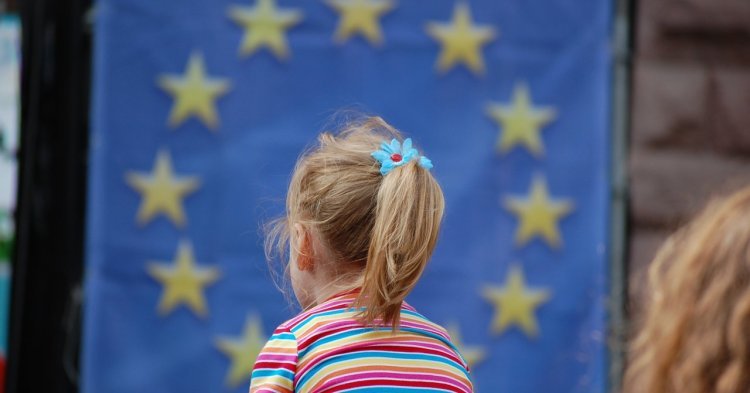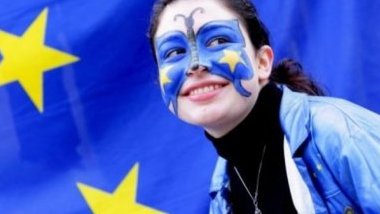Surprisingly, the only country in Europe that has set a public holiday on May 9 for the sake of “Europe Day” is the Republic of Kosovo, which is not even a Member State of the EU. Within the EU itself, the symbol of May 9 faces problems of overlapping with other celebrations such as Victory Day, notably in Central and Eastern Europe. In France, the succession of the public holiday celebrating the end of WWII on May 8th with Europe Day 9th results in an effective message: We had war, now we have peace – thanks to the European construction. We were once enemies, now we are partners and friends in the EU. Unfortunately the metaphor carried by fortunate coincidence in the French national calendar remains limited to the French case.
Indeed, as the official end of the WWII is commonly set with the surrender of Nazi Germany on May 8th at 11:01 p.m. (Berlin time), Moscow celebrated it already on May 9, due to the time zone difference. As a result, V-Day has been celebrated on May 9 in all countries to the East of the Iron Curtain throughout the USSR era, carrying the meaning of the “Liberation of people by the Red Army”.
In reality, for the population of countries under Soviet rule, May 9 represented the day “we traded Hitler for Stalin”, according to former Lithuanian President Valdas Adamkus (1) and therefore still carries negative meaning in Central and Eastern countries.
Is May 9 more meaningful to Eastern Europe than the original members?
Nonetheless, with the integration of CEE countries in the EU in the early 2000s, shifts in the celebration of V-Day appeared in order to align with the Western narrative on WWII, notably in the Baltic States and Visegrad countries. A good example of this shift is Poland where V-Day was celebrated on May 9 until 2015. In April 2015, the Polish Sejm decided with an overwhelming majority (396 for, 5 against and 14 abstentions) to change not only the date of V-Day but also the official name of the celebration. (2) From Święta Zwycięstwa i Wolności, literally “Holy Victory and Freedom” celebrated on May 9, Poland started to celebrate V-Day on May 8 as Narodowy Dzień Zwycięstwa, « National Victory Day » from 2016. By suppressing the word « Freedom » and adding « National » to the official celebration name, Polish deputies marked their will to emancipate themselves from the last marks of influence of the Soviet era in their historical narratives. In doing so, they also finally left room for the celebration of Europe Day on May 9 in aligning their own calendar with those of Western Member States.
Such a process of shifting additionally recalls the important efforts made by Eastern and Central Europe in order to be able to join the EU, efforts that are sometimes underestimated in founding Member States, which themselves never had to meet today’s EU conditional benchmarks for membership.
Europeans, make May 9 more visible!
In the meantime, this voluntary shift to leave room for Europe Day festivities in Eastern Europe represents a call to unity and to finally celebrate May 9 as Europe Day from Ireland to Cyprus, from Finland to Portugal for the sake of today’s European Peace. Because this is what the Schuman Declaration of May 9 has brought to our continent. Eurosceptics may tend to explain today’s European Peace exclusively through Cold War and the nuclear deterrent, but it is very regrettable from them to omit how the European construction successfully managed to spread and anchor values of peace and understanding among the population of our once war-torn continent. This is where European integration marks its efficiency in not only bringing about peace but also in sustaining it.
Unfortunately, in a few decades survivors of WWII will no longer be among us anymore to remind us of this important story. Therefore May 9 shall be a sustainable ritual for all Europeans to remember and celebrate European Peace.
“If a European Identity could be established and its elements clearly identified, the institutions of the European community would have a much stronger point of reference from which to gather loyalty from its citizens and build up a much needed legitimacy.” (3)
May 9 is an element of identity that shouldn’t be underestimated among European federalists as they pursue the European project and foster a sense of belonging to the EU among citizens. Recognisable symbols such as Europe Day are tangible elements that need to be more visible to the citizens to remind them of the importance of maintaining peace through solidarity in Europe.
The Young European Federalists take to the streets on Europe Day to celebrate what the European project has accomplished so far. We display the solidarity that the founders of the project talked about, all the while giving a reminder that we can and should do more as a union of peoples.
#ourEurope is the hashtag to follow on social media! #JEFspirit, and #jef45 to celebrate the 45th birthday of JEF, should not be forgotten either. Take part on social networks and, of course, in real life! If we don’t stand up to defend our vision of Europe, others will realise theirs. On May 9, what we want to see the public talk about is not their Europe, but #ourEurope!
Footnotes
(1) Eva-Clarita Onken, “The Baltic states and Moscow’s 9 May”, 24. (2) http://wyborcza.pl/1,75478,17810729,Sejm__Dzien_Zwyciestwa_bedziemy_obchodzic_8_maja.html (3) Soledad Garcia and Helen Wallace, European Identity and the Search for Legitimacy, 1993, 172.


Follow the comments: |
|
